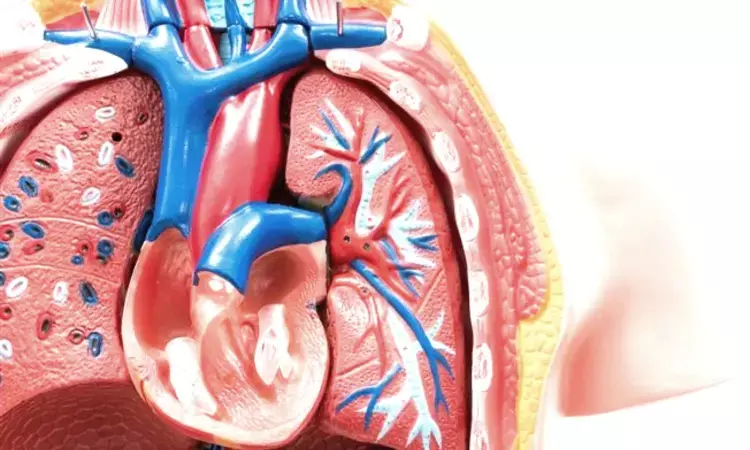- Home
- Medical news & Guidelines
- Anesthesiology
- Cardiology and CTVS
- Critical Care
- Dentistry
- Dermatology
- Diabetes and Endocrinology
- ENT
- Gastroenterology
- Medicine
- Nephrology
- Neurology
- Obstretics-Gynaecology
- Oncology
- Ophthalmology
- Orthopaedics
- Pediatrics-Neonatology
- Psychiatry
- Pulmonology
- Radiology
- Surgery
- Urology
- Laboratory Medicine
- Diet
- Nursing
- Paramedical
- Physiotherapy
- Health news
- Fact Check
- Bone Health Fact Check
- Brain Health Fact Check
- Cancer Related Fact Check
- Child Care Fact Check
- Dental and oral health fact check
- Diabetes and metabolic health fact check
- Diet and Nutrition Fact Check
- Eye and ENT Care Fact Check
- Fitness fact check
- Gut health fact check
- Heart health fact check
- Kidney health fact check
- Medical education fact check
- Men's health fact check
- Respiratory fact check
- Skin and hair care fact check
- Vaccine and Immunization fact check
- Women's health fact check
- AYUSH
- State News
- Andaman and Nicobar Islands
- Andhra Pradesh
- Arunachal Pradesh
- Assam
- Bihar
- Chandigarh
- Chattisgarh
- Dadra and Nagar Haveli
- Daman and Diu
- Delhi
- Goa
- Gujarat
- Haryana
- Himachal Pradesh
- Jammu & Kashmir
- Jharkhand
- Karnataka
- Kerala
- Ladakh
- Lakshadweep
- Madhya Pradesh
- Maharashtra
- Manipur
- Meghalaya
- Mizoram
- Nagaland
- Odisha
- Puducherry
- Punjab
- Rajasthan
- Sikkim
- Tamil Nadu
- Telangana
- Tripura
- Uttar Pradesh
- Uttrakhand
- West Bengal
- Medical Education
- Industry
SAVR or TAVI, which gives better outcomes in patients with severe aortic stenosis? Meta-analysis provides insights

USA: Transcatheter aortic valve implantation (TAVI) versus surgical aortic valve replacement (SAVR) has an early advantage concerning disabling stroke and death for patients with symptomatic severe aortic stenosis in lower-risk cohorts, according to a meta-analysis of randomized trials.
The study featured in the European Heart Journal further found that patients performed similarly well in either procedure over the longer term and in higher-risk groups. Informed therapy decisions may be more dependent temporality of events or secondary endpoints compared to long-term primary outcomes.
Yousif Ahmad from Yale University in New Haven, USA, and colleagues performed a meta-analysis comparing TAVI to SAVR. A pragmatic risk classification was applied, dividing lower-risk and higher-risk patients. Additional randomized clinical trial (RCT) data comparing TAVI with SAVR is available, including longer-term follow-up.
They addressed the question, "what are the clinical outcomes for patients with symptomatic severe aortic stenosis treated with either TAVI or SAVR in randomized controlled trials? RCTs were pragmatically classified as lower or higher-risk trials.
A random-effects meta-analysis was conducted. It included eight RCTs with 8698 patients. The primary endpoints included strokes, death, and the composite of disabling stroke or death, occurring at one year (early) or after one year (later).
The study revealed the following findings:
- In lower-risk patients, at one year, the risk of death was lower after TAVI compared with SAVR [relative risk (RR) 0.67], as was death or disabling stroke (RR 0.68).
- There were no differences in strokes. After one year, in lower-risk patients, there were no significant differences in all primary outcomes.
- In higher-risk patients, there were no significant differences in primary outcomes.
- New-onset atrial fibrillation, acute kidney injury, and major bleeding occurred less after TAVI; new pacemakers, vascular complications, and the paravalvular leak occurred more after TAVI.
The researchers found an early mortality reduction with TAVI but no differences following later follow-up in lower-risk patients. Also, there was an early reduction in the composite of disabling stroke or death, with no difference at later follow-up.
"For higher-risk patients, there were no significant differences," the researchers wrote. "Informed therapy decisions may depend more on the temporality of events or secondary endpoints than the long-term occurrence of main clinical outcomes."
Reference:
Yousif Ahmad, James P Howard, Ahran D Arnold, Mahesh V Madhavan, Christopher M Cook, Maria Alu, Michael J Mack, Michael J Reardon, Vinod H Thourani, Samir Kapadia, Hans Gustav Hørsted Thyregod, Lars Sondergaard, Troels Højsgaard Jørgensen, William D Toff, Nicolas M Van Mieghem, Raj R Makkar, John K Forrest, Martin B Leon, Transcatheter versus surgical aortic valve replacement in lower-risk and higher-risk patients: a meta-analysis of randomized trials, European Heart Journal, 2023;, ehac642, https://doi.org/10.1093/eurheartj/ehac642
Dr Kamal Kant Kohli-MBBS, DTCD- a chest specialist with more than 30 years of practice and a flair for writing clinical articles, Dr Kamal Kant Kohli joined Medical Dialogues as a Chief Editor of Medical News. Besides writing articles, as an editor, he proofreads and verifies all the medical content published on Medical Dialogues including those coming from journals, studies,medical conferences,guidelines etc. Email: drkohli@medicaldialogues.in. Contact no. 011-43720751


